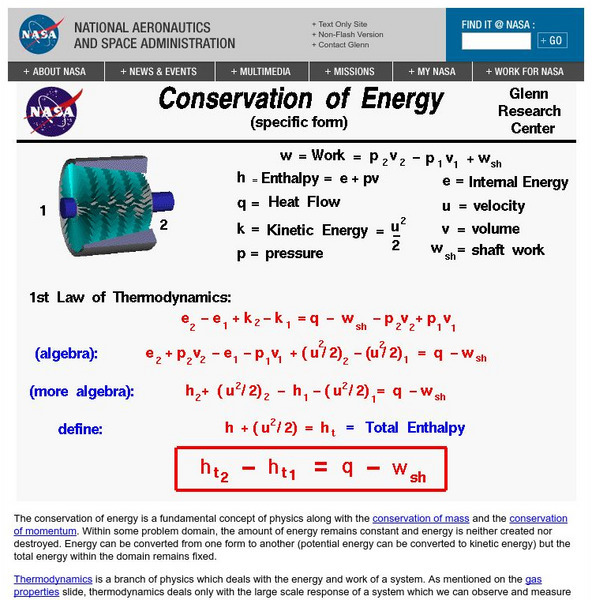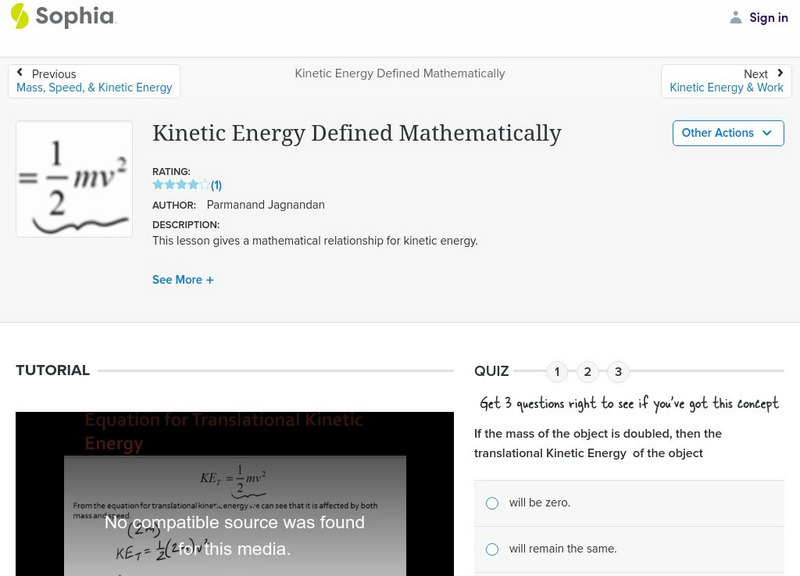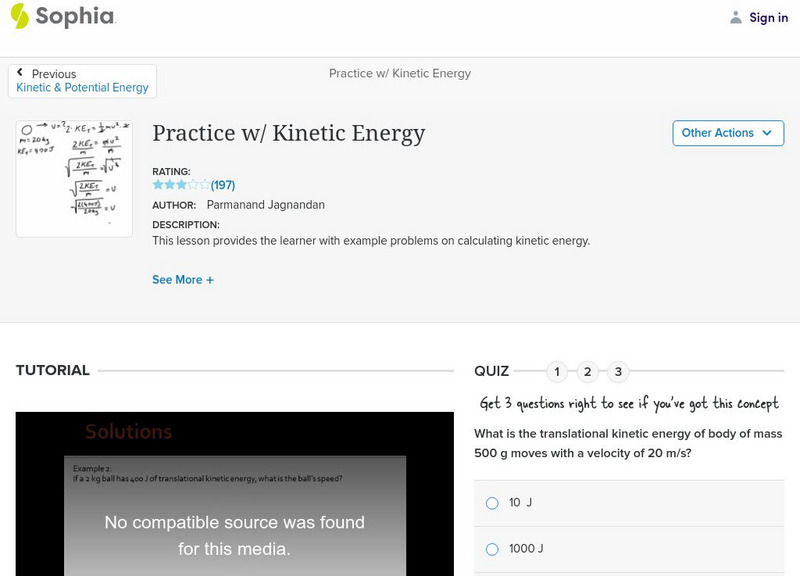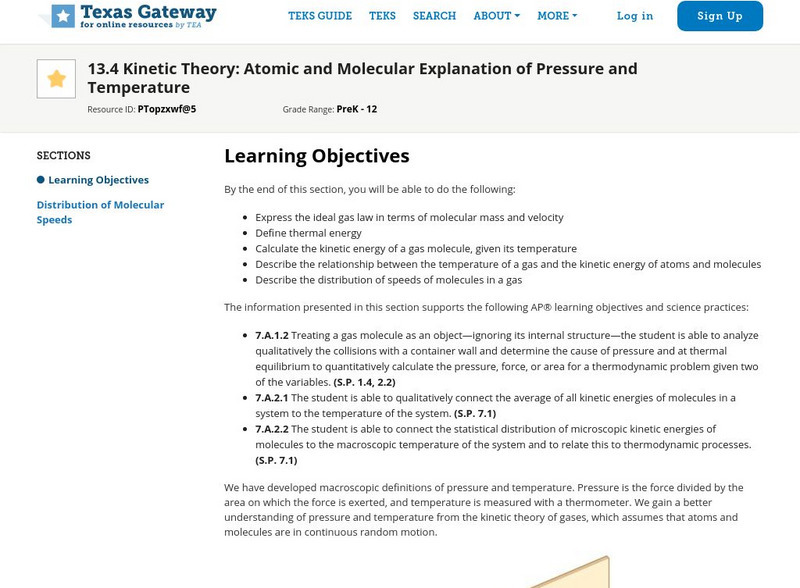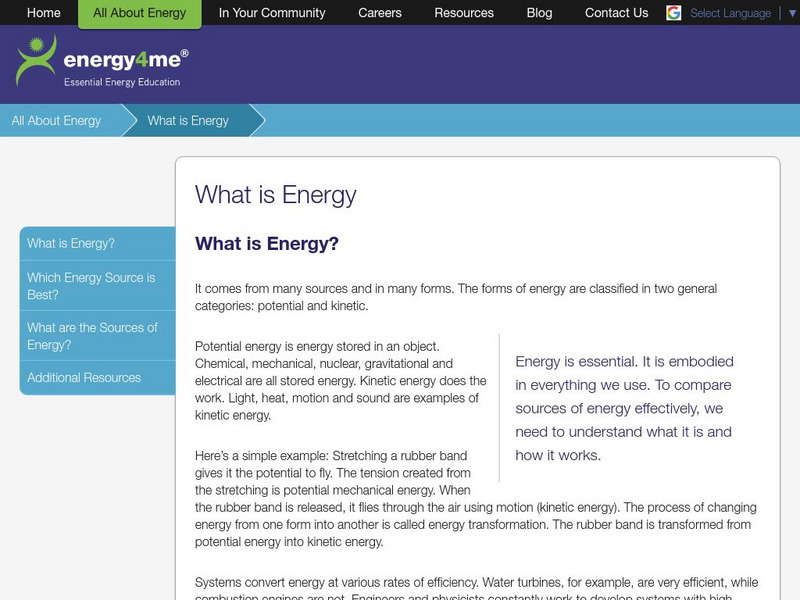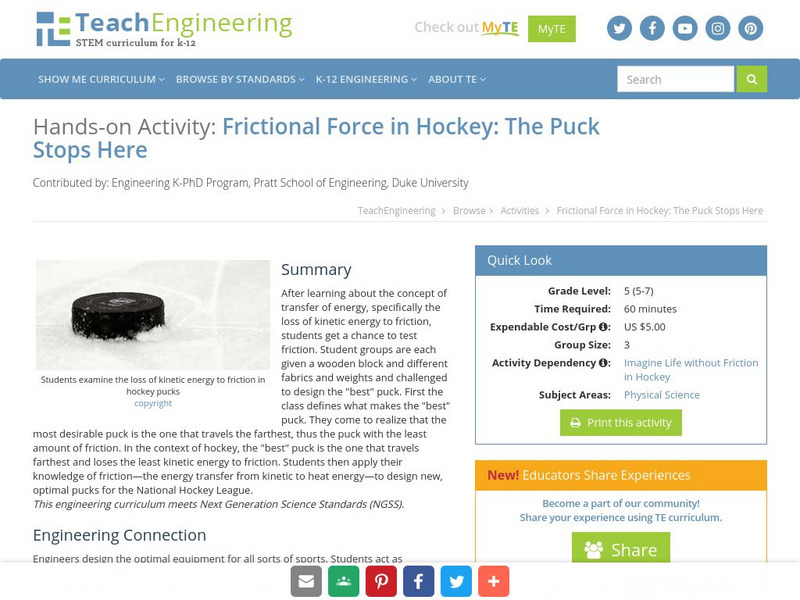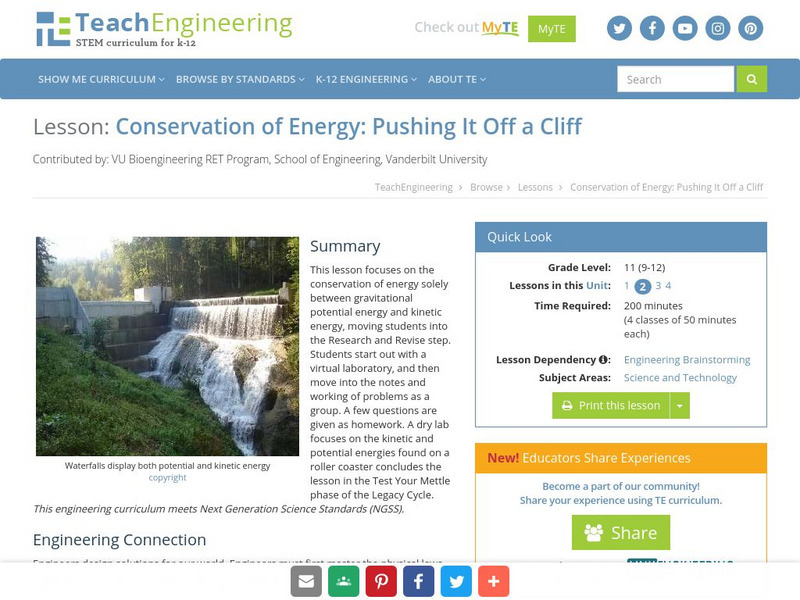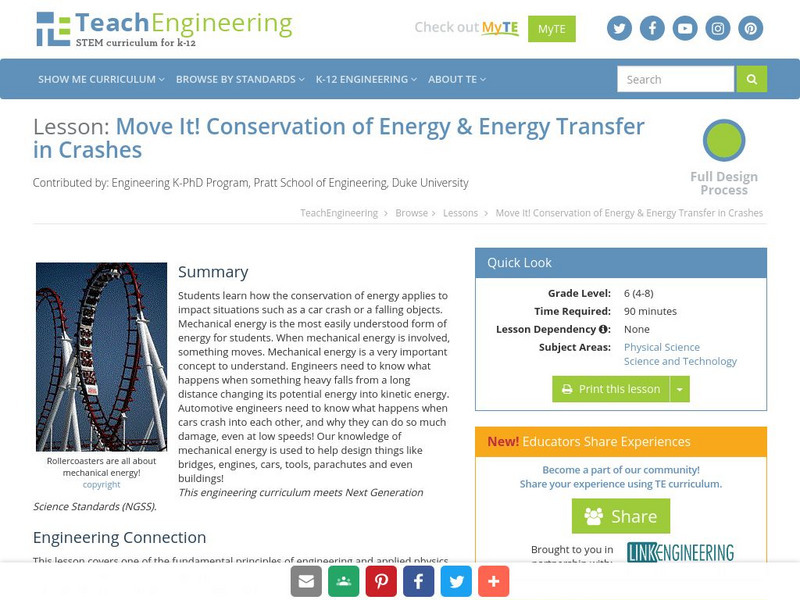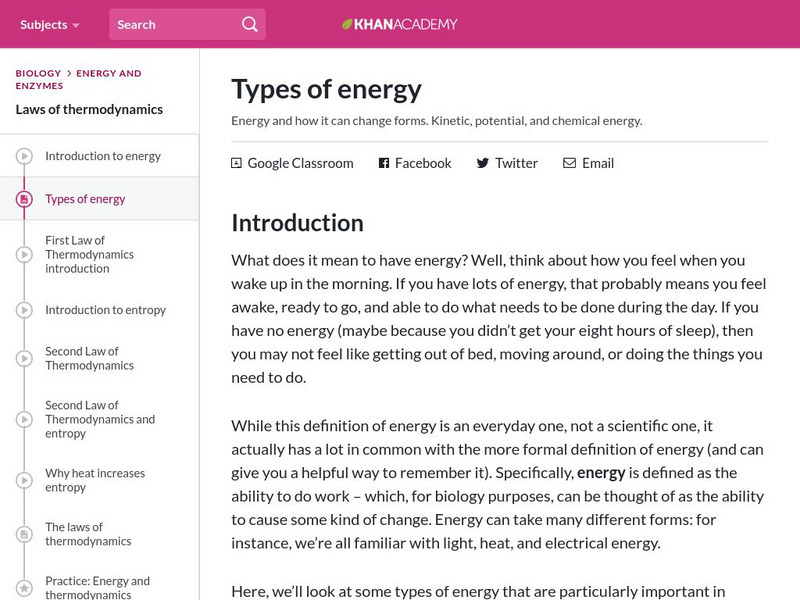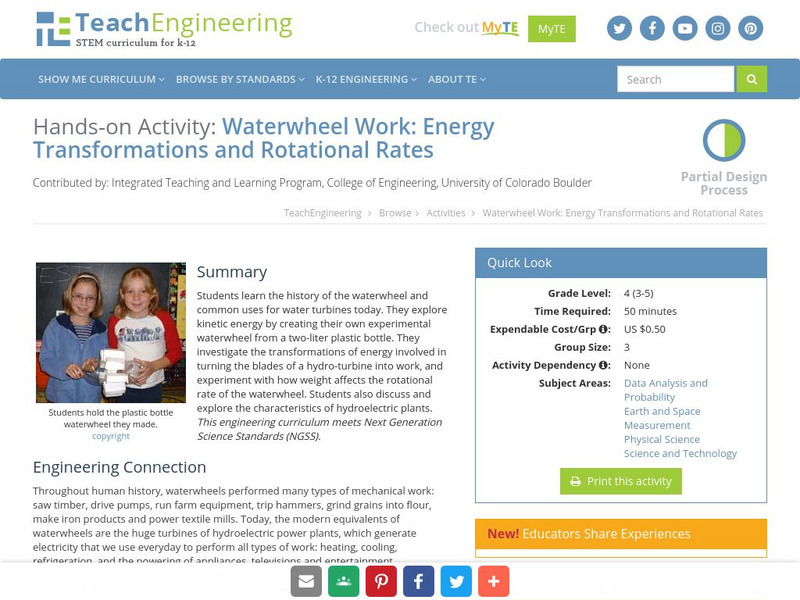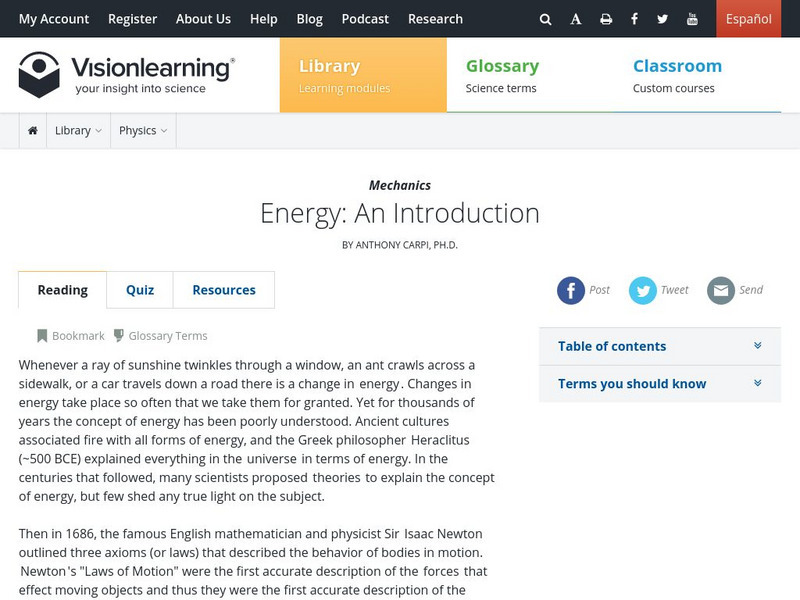Hi, what do you want to do?
US Energy Information Administration
U.s. Eia Energy Kids
This comprehensive lesson teaches all about energy, including the different forms, the periodic table, history of human energy use and production, and energy units. It contains an interactive energy calculator, games and activities, and...
Other
Need: Exploring Nuclear Energy [Pdf]
This downloadable article addresses all aspects of nuclear energy. Visual charts make understanding of cycles and concepts easier. Most useful for older students and educators. PDF (requires Adobe Reader).
NASA
Glenn Research Center: Conservation of Energy
From the Glenn Research Center at NASA, read about the law of conservation of energy. Included are formulas and many links to key terms.
The Wonder of Science
The Wonder of Science: 4 Ps3 1: Motion Energy
Work samples, phenomena, assessment templates, and videos that directly address standard 4-PS3-1: motion energy.
Science Buddies
Science Buddies: Put Your Water to Work: Using Hydropower to Lift a Load
Water creates a lot of energy, just look at the Grand Canyon. In this science fair project, you will demonstrate the power of water by converting the kinetic energy in moving water to mechanical energy, which will lift a small weight.
Texas Education Agency
Texas Gateway: Work Energy Theorem
Using diagrams, illustrations, and relevant data, students will calculate the net work done on an object, the change in an object's velocity, and the change in an object's kinetic energy.
Sophia Learning
Sophia: Introduction to Kinetic Energy
This lesson introduces the concept of kinetic energy.
Sophia Learning
Sophia: Kinetic Energy Defined Mathematically
This lesson gives a mathematical relationship for kinetic energy.
Sophia Learning
Sophia: Practice W/ Kinetic Energy
This lesson provides the learner with example problems on calculating kinetic energy.
Sophia Learning
Sophia: Kinetic Energy & Work
This lesson explains how kinetic energy and work are related.
Texas Education Agency
Texas Gateway: Atomic and Molecular Explanation of Pressure and Temperature
We gain a better understanding of pressure and temperature from the kinetic theory of gases, which assumes that atoms and molecules are in continuous random motion. Learn more about Kinetic Theory with the following detailed resource...
Science Struck
Science Struck: The 13 Types of Energy and Their Applications
Read about all the different kinds of potential and kinetic energy. Includes energy formulas and examples of energy applications.
Energy4Me
Energy4me: What Is Energy
Learn the difference between potential and kinetic energy, and how this plays a role in the sources we use for our energy needs.
TeachEngineering
Teach Engineering: The Puck Stops Here
After learning about transfer of energy, specifically the loss of kinetic energy to friction, students get a chance to test friction. In groups they are given a wooden block, different fabrics, and weights and asked to design the "best"...
TeachEngineering
Teach Engineering: Pushing It Off a Cliff
Lesson 2 moves into the Research and Revise step and focuses on the conservation of energy solely between gravitational potential energy and kinetic energy. Students start out with a virtual laboratory, and then move into the notes and...
TeachEngineering
Teach Engineering: Move It!
Mechanical energy is the most easily understood form of energy for students. When there is mechanical energy involved, something moves. Mechanical energy is a very important concept to understand. Engineers need to know what happens when...
TeachEngineering
Teach Engineering: It's Tiggerific!
In Lesson 3, as part of the Research and Revise step, students investigate potential energy held within springs (elastic potential energy). Class begins with a video of either spring shoes or bungee jumping. Students then move on into...
Khan Academy
Khan Academy: Biology: Enzymes and Energy: Types of Energy
An article that reviews over the different types of energy: kinetic, potential, and chemical.
CK-12 Foundation
Ck 12: Liquids
[Free Registration/Login may be required to access all resource tools.] In the following online tutorial students will describe a liquid according to the kinetic-molecular theory. They will also learn how a liquid exhibits surface...
TeachEngineering
Teach Engineering: Falling Water
Students drop water from different heights to demonstrate the conversion of water's potential energy to kinetic energy. They see how varying the height from which water is dropped affects the splash size. They follow good experiment...
TeachEngineering
Teach Engineering: Waterwheel Work
Students learn the history of the waterwheel and common uses for water turbines today. They explore kinetic energy by creating their own experimental waterwheel from a two-liter plastic bottle. They investigate the transformations of...
Vision Learning
Visionlearning: General Science: Energy: An Introduction
Instructional module focusing on energy. Discussion includes forms of energy, conservation of energy, and the laws of thermodynamics. Site also includes an interactive practice quiz and links relating to the topic.
Texas Education Agency
Texas Gateway: Forms of Energy
Given diagrams, illustrations, or descriptions, students will identify the types of energy.
CK-12 Foundation
Ck 12: Physics: Energy Study Guide
Understand and review energy concepts with this study guide.
Other popular searches
- Potential and Kinetic Energy
- Potential Kinetic Energy
- Potential & Kinetic Energy
- Kinetic Energy Questions
- Thermal and Kinetic Energy
- Kinetic Energy Lesson Plans
- Kinetic Energy of Particles
- Kinetic Energy Problems
- Science Kinetic Energy
- Potentail and Kinetic Energy
- Kinetic Energy Experiment
- Pot Entail and Kinetic Energy





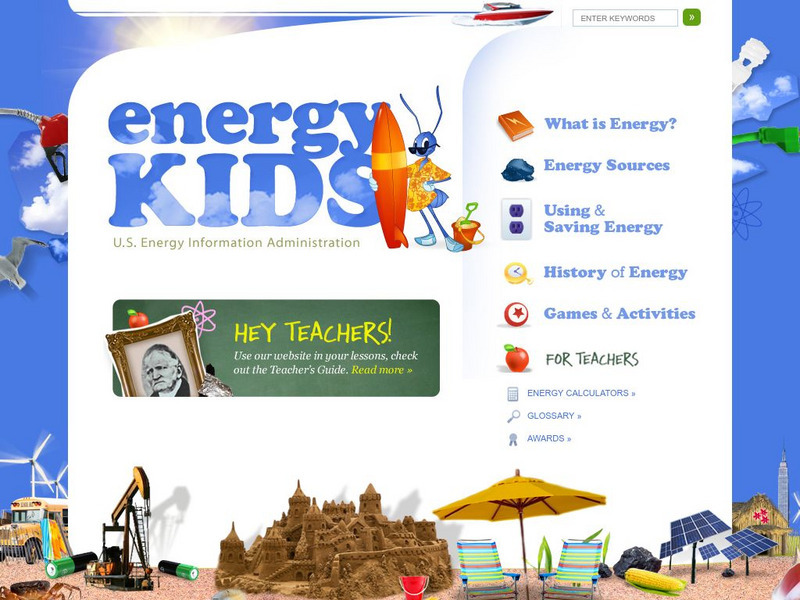
![Need: Exploring Nuclear Energy [Pdf] Handout Need: Exploring Nuclear Energy [Pdf] Handout](https://static.lp.lexp.cloud/images/attachment_defaults/resource/large/FPO-knovation.png)
